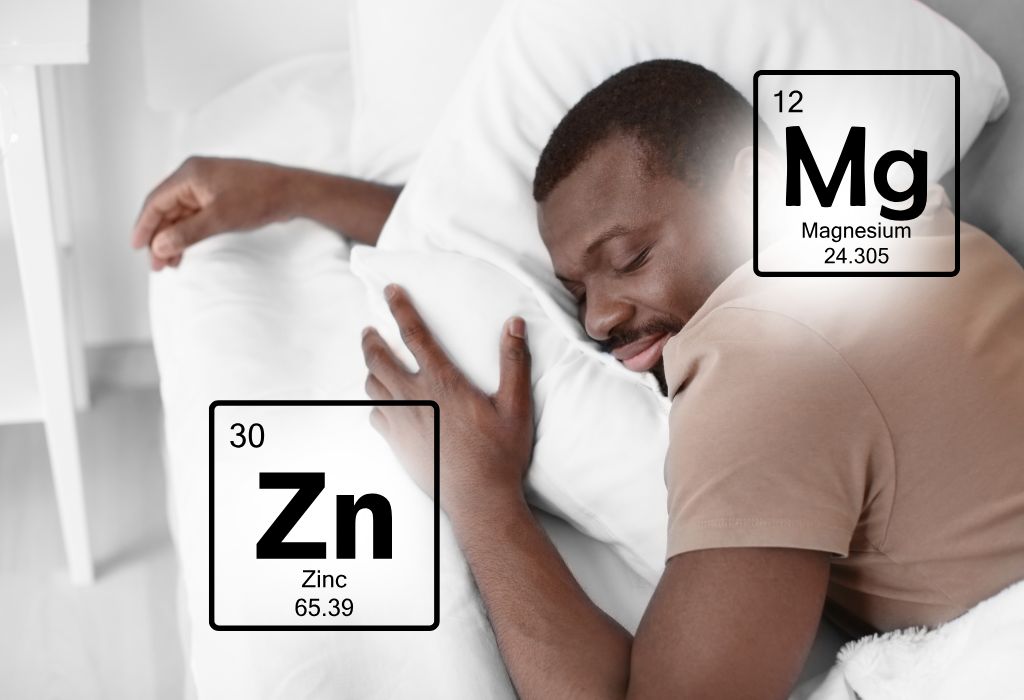
Take Zinc And Magnesium For Sleep: Should I Try?
It is possible to combine zinc and magnesium to improve sleep quality. This is the answer to a question that many people are seeking, especially those who struggle with sleep or stress.
Zinc and magnesium are two essential minerals that not only support various physiological functions but also have a positive effect on sleep. However, does supplementing both at the same time work as expected? In this article, we will explore the benefits of zinc and magnesium for sleep and how to use them safely and effectively.
Before exploring further, please read the disclaimer located at the end of this webpage.
Key Takeaways
- Zinc helps convert melatonin, the hormone that regulates sleep, improves sleep quality, reduces stress and anxiety, and regulates the body's biological clock.
- Magnesium boosts GABA activity, reduces anxiety, and increases melatonin production, which supports better sleep. It also helps reduce restless leg syndrome (RLS).
- Combining zinc and magnesium can improve sleep quality with recommended dosages of Magnesium 400-500 mg/day and zinc 15-50 mg/day.
- Take zinc and magnesium 30-60 minutes before bedtime, with a light meal, and avoid combining them with calcium to optimize absorption.
Understanding Zinc
What Is Zinc?

Zinc is an essential mineral that the body cannot produce or store. This mineral is crucial in many bodily functions, including supporting the immune system, enzyme activity, protein synthesis, wound healing, and cell metabolism [1].
Zinc participates in hundreds of enzymatic processes in the body, helping to maintain overall health. It is also important for growth and development, particularly during pregnancy, infancy, childhood, and adolescence. Additionally, it supports the senses of taste and smell.
Zinc Benefits For Sleep
Supports Melatonin Metabolism: Zinc is involved in the metabolism of melatonin, a key hormone that regulates sleep. This hormone is primarily produced at night, with the main function of triggering and maintaining sleep.
Improves Sleep Quality: A study showed that combining zinc, melatonin, and magnesium helps improve sleep quality, reducing nighttime awakenings and increasing sleep recovery value [2].
Reduces Stress and Anxiety: Zinc has a calming effect, soothing the nervous system and reducing stress, thereby improving sleep. It also has antidepressant properties, helping the mind relax before falling asleep.
Regulates the Biological Clock: Zinc helps regulate the sleep phase of the body's circadian rhythm, promoting a balanced sleep-wake cycle and making it easier to fall asleep.
Understanding Magnesium
What Is Magnesium?

Magnesium is an essential mineral that is vital to many bodily functions. This mineral is naturally found in many foods and is available in supplement form.
Magnesium participates in over 300 enzymatic reactions in the body, regulating many important biological processes such as protein synthesis, maintaining normal muscle function, regulating blood sugar, regulating blood pressure, synthesizing DNA and RNA, and transporting ions like calcium and potassium [3][4].
Magnesium Benefits For Sleep
Regulates the Nervous System: Magnesium helps enhance the activity of GABA (Gamma-aminobutyric acid), a neurotransmitter in the brain that calms the central nervous system. This helps reduce brain activity and promotes a sense of relaxation, making it easier to sleep [5].
Reduces Anxiety and Stress: Magnesium can reduce stress by acting on the nervous system. Reducing stress can enhance relaxation, thereby improving sleep.
Increases Melatonin Production: Research shows that magnesium deficiency can lower melatonin levels in the body. Supplementing with magnesium can boost melatonin production and improve sleep.
Reduces Restless Leg Syndrome (RLS): Magnesium may help alleviate the symptoms of restless leg syndrome, a condition that causes discomfort in the legs and makes it difficult for sufferers to sleep [6].
Is It Safe To Take Zinc And Magnesium For Sleep?

Combining zinc and magnesium to improve sleep quality is considered safe when taken in the recommended dosages. Many studies have shown that combining these two minerals with melatonin can significantly benefit people with sleep problems.
One study conducted on elderly individuals with insomnia showed positive results. Over the course of 8 weeks, participants who took a daily regimen containing magnesium (225 mg), zinc (11.25 mg), and melatonin (5 mg) saw significant improvements in sleep quality compared to the placebo group.
These participants reported easier sleep onset, longer sleep duration, and feeling more alert upon waking up [7]. This study was conducted with elderly individuals living in long-term care facilities, and the results were measured using the Pittsburgh Sleep Quality Index (PSQI).
Specifically, the treatment group showed significant improvements in sleep onset time, sleep quality, and wakefulness. The results indicate that combining zinc and magnesium can enhance sleep quality.
While studies indicate the effectiveness of these two compounds for sleep, the exact mechanisms and interactions between them are not fully understood. If you are considering supplementing with zinc and magnesium, consult a doctor, especially if you have pre-existing health conditions or are taking other medications.
Dosage And Side Effects
Combining zinc and magnesium to support sleep can offer benefits, but attention must be paid to dosage and potential side effects. Although no side effects have been reported from supplements containing these two minerals, magnesium and zinc, high doses or improper use may lead to side effects.
Recommended Dosage
The recommended zinc and magnesium supplements dosage can vary depending on age, gender, and health condition. Below are the recommended dosages for these minerals:
- Magnesium: 400-500 mg per day — 100-125% DV
- Zinc: 15-50 mg per day — 136-455% DV
Note that supplement products often vary in dosage, especially with zinc. Many products contain 30-50 mg of zinc; however, following the dosage listed on the label is important to avoid side effects.
Side Effects
When used in high doses, these minerals can cause some side effects, such as:
- Headache
- Nausea and vomiting
- Diarrhea
- Constipation
- Stomach pain and cramps
- Loss of appetite
- Muscle weakness
- Tingling or numbness
If you experience these symptoms, reduce the dosage or stop using the supplements and consult a doctor.
Note: Some studies indicate that high doses of zinc (over 50 mg per day) may reduce copper absorption, leading to copper deficiency. Therefore, if you experience symptoms of copper deficiency (anemia, fatigue, muscle weakness, pale skin, arrhythmia, etc.) while using zinc supplements, be mindful of the dosage and seek appropriate recovery advice from a professional.
How To Use Zinc And Magnesium Before Bedtime

First, zinc and magnesium for sleep should start with the correct dosage. Ensure you follow the dosage recommended in this article or consult a specialist based on your health condition. Additionally, here are a few things to keep in mind if you want to use these two compounds before bed:
Choose the right form of zinc and magnesium
Magnesium comes in different forms, including magnesium citrate, glycinate, and magnesium oxide. Magnesium glycinate is typically recommended due to its high absorption and minimal stomach irritation. Zinc also comes in various forms, such as zinc citrate, zinc gluconate, and zinc picolinate. Among these, zinc picolinate is commonly used.
Timing
The best time to take zinc and magnesium is 30-60 minutes before bed. After supplementation, the body needs time to absorb the minerals and fully utilize their relaxing effects.
Take with food or a light snack
While magnesium can be taken on an empty stomach, it may cause discomfort for some people, and the same can be said for zinc. Therefore, if you eat dinner early, prepare a small snack with zinc and magnesium.
Avoid taking with calcium
Calcium can reduce magnesium absorption, so it is best to take it at a different time of day if you also use zinc and magnesium before bed.
Zinc Magnesium Supplement For Sleep
Using zinc and magnesium supplements has become increasingly popular as a scientific method to improve sleep quality. Both minerals play a significant role in maintaining relaxation and supporting a healthy sleep cycle, but they are even more effective when combined under the supervision of a specialist and tested in a laboratory setting.
If you're unsure about the dosage or how to combine zinc and magnesium, available supplements can help you achieve this. Many products on the market combine zinc and magnesium, sometimes adding ingredients like vitamin D or melatonin to enhance their effects on sleep.
However, to select the right product, you must thoroughly research its functions and ingredients. You should also consider whether the nutrient content in each serving is sufficient to address your sleep issues.
Frequently Asked Questions
Can Magnesium React With Zinc?
Magnesium and zinc do not react directly with each other. Magnesium tends to be more reactive than zinc, which means magnesium will create stronger positive ions, preventing zinc from taking over magnesium’s role in compounds. Therefore, these two minerals can coexist without any significant chemical interaction issues.
What Supplements Should You Not Take With Zinc?
Zinc should not be taken with iron or calcium because they can compete forabsorption. Excessive zinc intake can also affect copper levels in the body, leading to copper deficiency. Therefore, if you are taking zinc, consider supplementing with copper or choose multivitamin products that contain copper to maintain balance.
How Long Before Bed Should I Take Zinc?
You should take zinc at least 30-60 minutes before bedtime to achieve optimal results. This allows the body enough time to absorb the mineral and activate its relaxing effects, helping you sleep more deeply and with better sleep quality.
Should I Take Zinc And Magnesium At Night?
Both zinc and magnesium are beneficial for overall health, especially when taken at night. Magnesium helps relax the body and improves sleep quality, while zinc supports immune function and cell repair. Combining these two minerals at night can enhance recovery and relaxation, leading to deeper sleep and a refreshed feeling upon waking.
Conclusion
In conclusion, combining zinc and magnesium can effectively improve sleep quality, particularly for those who have difficulty maintaining deep sleep. Both minerals help the body relax and reduce stress, making it easier to fall asleep.
However, to achieve the best results, it is important to use them correctly and seek advice from healthcare professionals. Always pay attention to dosage and research thoroughly before starting any supplementation regimen.
References
- [1] MacDonald, R S. “The Role of Zinc in Growth and Cell Proliferation.” The Journal of Nutrition, vol. 130, no. 5S Suppl, 2000, pp. 1500S8S, www.ncbi.nlm.nih.gov/pubmed/10801966, https://doi.org/10.1093/jn/130.5.1500S.
- [2] Rondanelli, Mariangela, et al. “The Effect of Melatonin, Magnesium, and Zinc on Primary Insomnia in Long-Term Care Facility Residents in Italy: A Double-Blind, Placebo-Controlled Clinical Trial.” Journal of the American Geriatrics Society, vol. 59, no. 1, 2011, pp. 82–90, www.ncbi.nlm.nih.gov/pubmed/21226679, https://doi.org/10.1111/j.1532-5415.2010.03232.x.
- [3] National Institutes of Health. “Office of Dietary Supplements - Magnesium.” National Institutes of Health, 2 June 2022, ods.od.nih.gov/factsheets/Magnesium-HealthProfessional/.
- [4] ---. “Office of Dietary Supplements - Magnesium.” Nih.gov, 22 Mar. 2021, ods.od.nih.gov/factsheets/Magnesium-Consumer/.
- [5] Allen, Mary J., et al. “GABA Receptor.” PubMed, StatPearls Publishing, 13 Feb. 2023, www.ncbi.nlm.nih.gov/books/NBK526124/.
- [6] Marshall, Nathaniel S., et al. “Magnesium Supplementation for the Treatment of Restless Legs Syndrome and Periodic Limb Movement Disorder: A Systematic Review.” Sleep Medicine Reviews, vol. 48, 1 Dec. 2019, p. 101218, pubmed.ncbi.nlm.nih.gov/31678660/, https://doi.org/10.1016/j.smrv.2019.101218.
- [7] ---. “The Effect of Melatonin, Magnesium, and Zinc on Primary Insomnia in Long-Term Care Facility Residents in Italy: A Double-Blind, Placebo-Controlled Clinical Trial.” Journal of the American Geriatrics Society, vol. 59, no. 1, 2011, pp. 82–90, www.ncbi.nlm.nih.gov/pubmed/21226679, https://doi.org/10.1111/j.1532-5415.2010.03232.x.
Author

Product Disclaimer
Including an ingredient or study does not evaluate, endorse, or recommend any Vinatura product or any third-party product. Some ingredients discussed may not be used in any Vinatura product.
The content of the articles has not been evaluated by the Food and Drug Administration (FDA) and is not intended to promote or endorse any specific product. Any products sold on this website are not intended to diagnose, treat, cure, or prevent any disease.
Opinions and Endorsements
Any claims, statements, or opinions expressed in the articles are those of the author(s) and do not necessarily reflect the views or opinions of the manufacturers of the dietary supplement products. The products sold on this website are separate from the content of the articles and are not directly endorsed or associated with the information presented here.
Liability Disclaimer
The author(s) of the articles, website, and manufacturers of the dietary supplement products do not assume any liability for any potential consequences arising from the use of the information provided in the articles. Ingredient effects, dosages, and safety vary by individual, formulation, and context; some ingredients interact with medications or may be unsuitable during pregnancy or lactation. It is recommended that individuals consult with a qualified healthcare professional before making any dietary or lifestyle changes, including the use of dietary supplements.
Product Usage
Please refer to the product labels and packaging for specific usage instructions and guidelines for the dietary supplement products sold on this website.
Customer Support
For any concerns or questions regarding the dietary supplement products, please contact our customer support team, who will be more than happy to assist you.






Leave a Comment
Be the first to comment.
What do you think?